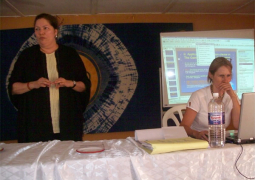
“This is the second year of the campaign exercise,” he said, adding that it is expected to last for one month throughout all regions of the country.
The exercise currently ongoing in the regions is being coordinated by the Department of Livestock Services (DLS) and jointly funded by the West Africa Agricultural Productivity Project (WAAPP) and Food and Agriculture Sector Development Project (FASDEP).
The exercise is carried out to reduce morbidity and mortality of rural chicken from the disease.
According to Mr Fofana, vaccination teams had been set up in all the regions, and “are presently conducting the vaccination exercise,” targeting about 700,000 birds to be vaccinated at the end of the exercise.
“This will significantly contribute towards increasing productivity of rural poultry, and subsequently improve the livelihood of rural farmers, particularly women and children.”
He also mentioned that during vaccination, farmers are also advised to improve the management of their flocks by providing improved housing and supplementary feed.
He said the lesson learnt so far in the exercise is that NCD is still being reported by farmers as a major threat to chickens’ production system, adding that chicken farmers are willing to vaccinate their chickens, but consistent campaigns are required to build their confidence and trust.
Farmers who have previously vaccinated their chickens have realized a reduction in mortality, and are willing to re-vaccinate their chicken, he added.
Asked what the message from the DLS is, Dr Fofana said that even though remarkable progress had been achieved with the significant reduction of disease outbreaks, mainly due to the cooperation and collaboration of farmers, DLS urges all poultry owners to protect their chickens against NCD by vaccinating them.
He said farmers are strongly advised to maintain good hygiene and sanitation in poultry houses, and they should not sell the infected birds at ‘lumos’ markets, rather they should bury or burn dead birds.
Dr Fofana further said that DLS through its veterinary and animal production directorates works all year round to significantly improve animal production and productivity in the country.
He also stated that over the years, DLS had conducted mass vaccination campaigns against CBPP in cattle, PPR in small ruminants and NCD in rural poultry.
In the same vein, the department in its annual work programme for 2016, has an integrated approach for the prevention and control of animal diseases through vaccination and surveillance.
Dr Fofana also stated that efforts are being made for smallholder poultry production to be more market-oriented, bringing sustainable improvements to the lives of resource-poor women and their families.
He said poultry diseases are usually mentioned by farmers as the major constraint inhibiting village chicken production, particularly the Newcastle Disease (NCD) which had been identified by women as a hindrance to expanding their flocks.
There is insufficient extension support for village/rural chickens, despite the high potential of rural chickens in improving food security, nutrition and poverty alleviation, he added.



